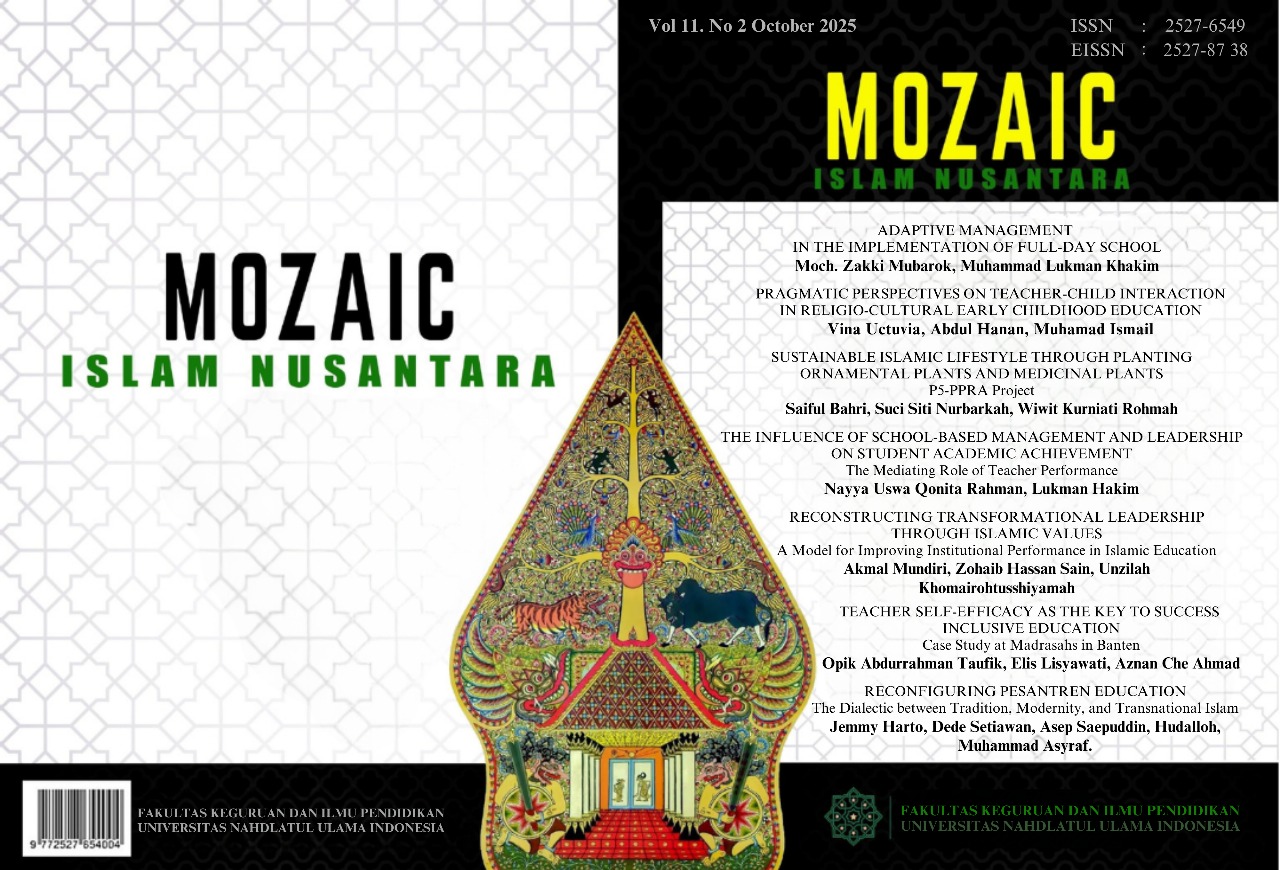Reconstructing Transformational Leadership through Islamic Values
A Model for Improving Institutional Performance in Islamic Education
DOI:
https://doi.org/10.47776/mozaic.v11i2.1829Keywords:
Islamic Education, islamic values, Transformational LeadershipAbstract
This study aims to reconstruct transformational leadership through the integration of Islamic values, offering a contextual model for enhancing the performance of Islamic educational institutions. The primary focus is to combine the core principles of transformational leadership with Islamic teachings to form a leadership framework that aligns with the spiritual, ethical, and cultural foundations of Islamic education. Using a qualitative approach and a case study design, research was conducted in several Islamic educational institutions across Indonesia. Data were collected through in-depth interviews, participant observation, and document analysis. The research findings indicate that Islamic values such as sincerity (ikhlas), trustworthiness (amanah), justice (‘adl), and deliberation (shura) reinforce the four key dimensions of transformational leadership: idealized influence, inspirational motivation, intellectual stimulation, and individualized consideration. These values do not replace transformational leadership elements but enrich and contextualize them, leading to improved institutional performance in managerial, academic, and spiritual aspects. The implications of this study underline the significance of internalizing Islamic values within leadership practices to build a productive, ethical, and spiritually grounded organizational culture. This integrated model can serve as a practical and theoretical reference for developing effective, authentic, and sustainable leadership in Islamic educational settings.
References
Adeoye, M. A., & Munawwaroh, I. (2025). Transformational Leadership in Education: Harmonising Accountability, Innovation and Global Citizenship. Kharisma: Jurnal Administrasi Dan Manajemen Pendidikan, 4(1), 14–30. https://doi.org/10.59373/kharisma.v4i1.68
Adhinugraha, R. B. A., Hardhienata, S., Sunaryo, W., Zaini, & Rozi, M. F. (2024). Transformative Strategies to Enhance Teacher Innovativeness: Addressing Challenges Through Strengthening Organizational Culture, Transformational Leadership, Self-Efficacy, and Achievement Motivation. Managere: Indonesian Journal of Educational Management, 6(2), 219–232. https://doi.org/10.52627/managere.v6i2.520
Ahmad, S., Islam, T., D’Cruz, P., & Noronha, E. (2023). Caring for those in your charge: the role of servant leadership and compassion in managing bullying in the workplace. International Journal of Conflict Management, 34(1), 125–149. https://doi.org/10.1108/IJCMA-05-2022-0098
Alazmi, A. A. (2025). School leadership in context: the influence of Islamic values and beliefs on Kuwaiti school principal practices. International Journal of Leadership in Education, 28(3), 618–638. https://doi.org/10.1080/13603124.2023.2292148
Albustomi, A. Y. (2025). The Significance of Spiritual Leadership in Redefining the Culture of Sustainable Quality: The Process of Internalizing Values. TIME Journal: Transformation of Islamic Management and Education Journal, 2(1), 41–51. https://journal.staimun.ac.id/index.php/time/article/view/144
Annisa, T. N., & Sukriyah, T. M. (2025). Transformation of Madrasahs in the Era of Globalization: Innovative Community Engagement Strategies to Enhance Competitiveness and Relevance. JIM: Jurnal Ilmu Multidisiplin, 1(1), 108–122. https://jurnalinspirasimodern.com/index.php/JIM/article/view/35
Baroudi, S. (2022). Leading in times of crisis: evidence of digital transformational leadership among Arab female educational leaders. International Journal of Leadership in Education, 1–22. https://doi.org/10.1080/13603124.2022.2108506
Berkovich, I., & Eyal, O. (2021). Transformational leadership, transactional leadership, and moral reasoning. Leadership and Policy in Schools, 20(2), 131–148. https://doi.org/10.1080/15700763.2019.1585551
Buanaputra, V. G., Astuti, D., & Sugiri, S. (2022). Accountability and legitimacy dynamics in an Islamic boarding school. Journal ofAccounting & Organizational Change, 18(4), 553– 570. https://doi.org/10.1108/JAOC-02-2021-0016
Burhan, Q.-A., & Khan, M. A. (2024). From identification to innovation: how empowering leadership drives organizational innovativeness. Leadership & Organization Development Journal, 45(3), 478–498. https://doi.org/10.1108/LODJ-05-2023-0215
Cañadas, A., Jácome, R., & Granero, L. P. (2025). Integral Humanistic Leadership Model. Humanistic Management Journal, 1–26. https://doi.org/10.1007/s41463-025-00213-2
Doten-Snitker, K., Margherio, C., Litzler, E., Ingram, E., & Williams, J. (2021). Developing a shared vision for change: Moving toward inclusive empowerment. Research in Higher Education, 62(2), 206–229. https://doi.org/10.1007/s11162-020-09594-9
Khan, I. U., Amin, R. U., & Saif, N. (2022). Individualized consideration and idealized influence of transformational leadership: Mediating role of inspirational motivation and intellectual stimulation. International Journal of Leadership in Education, 1–11. https://doi.org/10.1080/13603124.2022.2076286
Majeed, N., & Jamshed, S. (2023). Heightening citizenship behaviours of academicians through transformational leadership: Evidence based interventions. Quality & Quantity, 57(Suppl 4), 575–606. https://doi.org/10.1007/s11135-021-01146-2
Melinda, A., Sumiati, N.T., Ansari, A.S., & Haffiyan, A.F. (2024). Qanaah dan Penyesuaian Akademik pada Mahasiswa Lintas Jurusan: Peran Baru Dimensi Spiritualitas. Mozaic : Islam Nusantara, 10(2), 173-188. DOI:10.47776/mozaic.v10i2.1071.
Meng, H. (2022). Analysis of the relationship between transformational leadership and educational management in higher education based on deep learning. Computational Intelligence and Neuroscience, 2022(1), 5287922. https://doi.org/10.1155/2022/5287922
Rohmatulloh, R., Hasanah, A., Sahlani, L., & Zuhri, M. T. (2023). Energy-saving triangle: internalizing Islamic ethical values on energy saving in integrative learning. Religions, 14(10), 1284. https://doi.org/10.3390/rel14101284
Rosyidi, L. N., Sukoco, B. M., Mawardi, I., & Aslan, H. (2025). Market orientation and change capability on an Indonesian sharia banking performance: the moderating effect of leadership religiosity. Journal of Islamic Marketing, 16(3), 955–975. https://doi.org/10.1108/JIMA-07-2024-0287
Ruiz, A. M., Luebke, J., Klein, K., Moore, K., Gonzalez, M., Dressel, A., & Mkandawire‐ Valhmu, L. (2021). An integrative literature review and critical reflection of intersectionality theory. Nursing Inquiry, 28(4), e12414. https://doi.org/10.1111/nin.12414
Sain, Z. H., & Abdullah, N. B. (2024). Enhancing Higher Education Pedagogy with ChatGPT: Leveraging the Power of Generative AI. Journal Emerging Technologies in Education, 2(3), 267–281. https://doi.org/10.70177/jete.v2i3.1189
Samsul, Z. H. S. (2025). Quality Control in HR Management: Ensuring Accreditation in Higher Education. Evaluasi: Jurnal Manajemen Pendidikan Islam, 9(1), 142–158.
Saran, E., Mishra, S., Nigam, S., & Kumar, K. (2023). The Relevance of Value-Based Leadership and Spirituality in the Workplace. International Journal of Engineering, Management and Humanities (IJEMH) Volume, 4, 124–127.
Setyaningsih, S., & Sunaryo, W. (2021). Optimizing Transformational Leadership Strengthening, Self Efficacy, and Job Satisfaction to Increase Teacher Commitment. International Journal of Instruction, 14(4), 427–438. https://doi.org/10.29333/iji.2021.14425a
Setyosari, P., & Kamdi, W. (2021). Exploration of Moral Integrity Education and Superior Cadre Leadership at Madrasah Boarding School Indonesia. International Journal of Instruction, 14(4), 753–774. https://doi.org/10.29333/iji.2021.14443a
Thohir, P. F. D. M. (2024). Strengthening the Reputation of Islamic Boarding Schools: The Role of Leadership, Educational Innovation, and Local Wisdom. Managere: Indonesian Journal of Educational Management, 6(3), 331–346. https://doi.org/10.52627/managere.v6i3.720
Veronika, E., & Zaini, A. W. (2024). Overcoming Academic Challenges: The Role of Self- Efficacy in Reducing Student Burnout in PAI Learning. Journal of Social Studies and Education, 1(2), 73–86. https://doi.org/10.61987/jsse.v1i2.517
Downloads
Published
Issue
Section
License
Copyright (c) 2025 Akmal Mundiri, Zohaib Hassan Sain, Unzilah Khomairohtusshiyamah

This work is licensed under a Creative Commons Attribution 4.0 International License.














